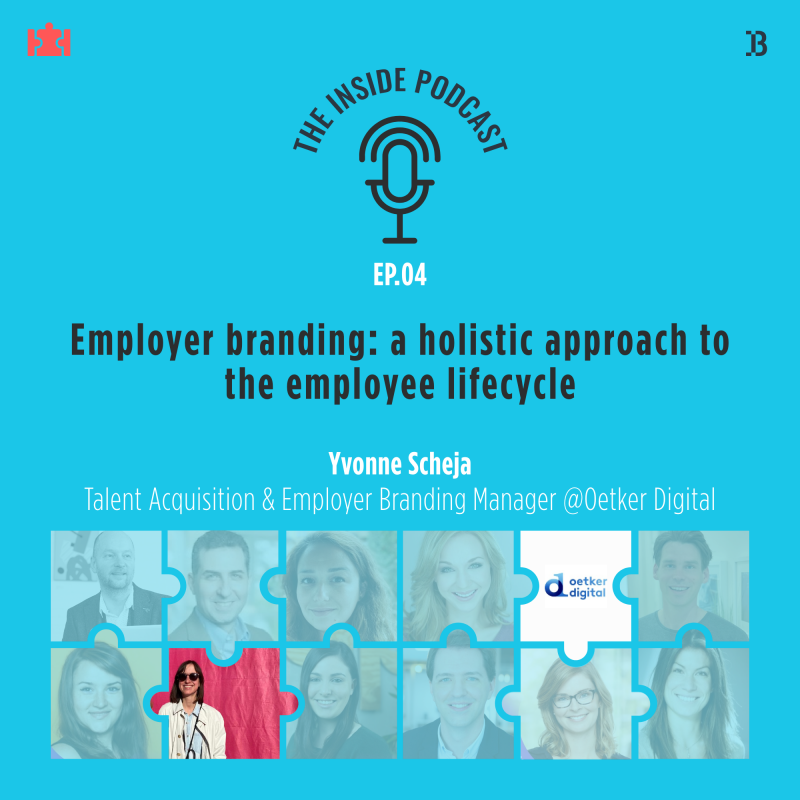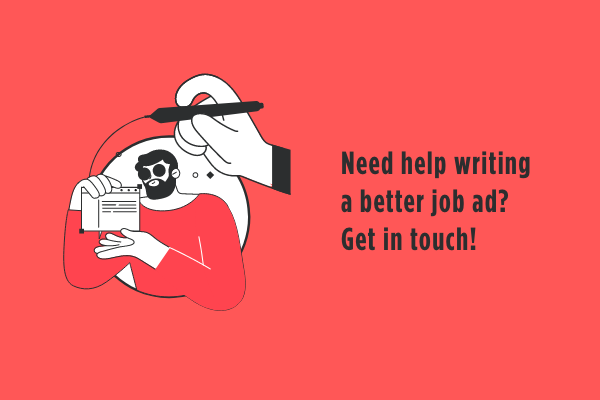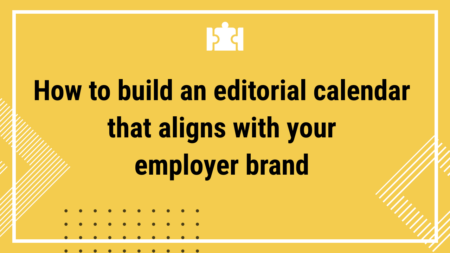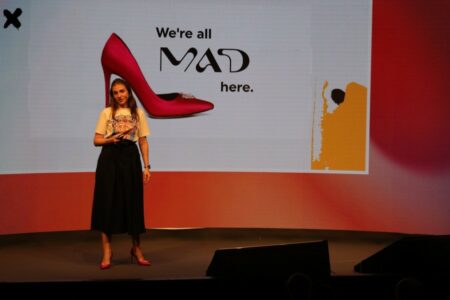Overview
We’re back with Ep.04 of Employer Branding: The Inside Podcast! Tune in to listen to Yvonne Scheja, Talent Acquisition & Employer Branding Manager at Oetker Digital GmbH, talk about the power of data in employer branding, and how research and data insights are vital when recruiting top talent. Throughout the podcast, we covered several other interesting topics on the role of creativity in talent acquisition, and a lot more.
What you’ll learn by listening
- The power of data in employer branding: how research and data go hand in hand
- Employer branding meets the art world: merging data with creativity
- Guidelines to keep the company culture united amid the pandemic
- #ExpertTiP: Employer branding is NOT a one-woman/man-show
- Recruiting top talent in tech goes beyond brand reputation
- Employer branding is a holistic approach to the employee lifecycle
About the company
We are Oetker Digital. Collaboratively we combine the Oetker Group’s traditions with new digital concepts, innovations and business models. To name but a few, we support established brands such as Dr. Oetker, Henkell, Coppenrath & Wiese and Radeberger, as well as Oetker Collection hotels. Together we develop ideas for consumers of the Oetker Group’s products in everyday life.
From our office in Berlin, we’re about 100 employees from five continents working on new products and digital transformation projects. Our values such as long-term success and collectivity, are based on those of a family-run company. We follow agile principles and with the clear intention of an open, positive learning culture.
Podcast link
Podcast transcription
Georgiana: Hi everyone! This is Georgiana with a new episode of Employer Branding: The Inside Podcast. And today I’m speaking with Yvonne Scheja, who is Talent Acquisition Manager and Employer Branding Manager for Oetker Digital here in Berlin. Actually, we are face to face right now. Welcome, Yvonne! So nice to meet you and to have you here today. Please tell us a little bit about what you do in your role and what the company does, actually.
Yvonne Scheja: So first of all, thanks for the invitation. I’m happy to be here and also meeting you in person. First of all, let’s talk about what Oetker Digital is doing. Many people might already relate to the brand, which is quite famous, especially Dr. Oetker. But we’re part of the whole Oetker Group. And we work on four topics to support the whole transformation of the group itself.
There is one part where we build our own ventures – maybe you have heard of Mehrwelt. They tend to go in a sustainable direction and also help to shape the future of food. Then we do have the product side where we work together with the Oetker Group on building products within the company. We are now in the process of creating an academy together with Oetker Group, which helps to share knowledge.
And the last topic we are working on is services where we also work together with the Oetker Group regarding, for example, digital marketing topics. So these are the four things we’re working on right now. And where I come into play is quite simple. I work especially for Oetker Digital. So the people I am recruiting for the company, tech talents who join Oetker Digital, and I also set the employer brand for Oetker Digital, not for the whole group, but for our company.
Georgiana: And you’ve been with them for three years?
Yvonne Scheja: A bit more than three years now.
Georgiana: And you know, I saw on the website that there are several teams in the organization of Oetker Digital, right? I saw DevOps, data and insights, digital marketing, among them. How difficult or easy is it to maintain all of them under a single employer branding, value or strategy after all?
Yvonne Scheja: Yeah, let’s say it’s not easy. For many people doing Employer Branding, I guess, at the end of the day, there are a lot of expectations. Many people have an opinion on employer branding, that’s also something you have to deal with; but also different departments. But what really helped to shape the employer branding of Oetker Digital is gaining data because data can’t lie. So at best you do and what we did was user research.
We spoke with employees, we spoke with market partners, we sent out surveys to cooperation partners. So we really tried to get as many people involved as possible, due to the nature of our organization, which is around 100 people and get a lot of insight. What we also did, what I can say is that we didn’t go for a classical employer value proposition sense. As described, our company is quite diverse.
Georgiana: Right, but here, I think the keyword is data, which I’m so happy about. Actually, so few companies nowadays also look at data when talking about Employer Branding. In my opinion it’s crucial, you can’t do anything without it.
Yvonne Scheja: Yeah, and as we also say, we are a data-driven company. We should really go for data and also help you as well. What I can give as advice to someone who’s new to the topic regarding management is, if you have to deal with them, saying okay, but we did this research, we figured out, we do have a base, so we know what our target group in general likes or any personas we shaped. So I think that’s super helpful at the end of day. Sometimes it can be a bit tough to conduct these research, but at least try to gain data or maybe you already have it in your organization from different tools you have in place.
Georgiana: Yes, this will definitely go as a separate post on social media because I really feel very strongly about it. How much or how little of the overall Oetker’s Group employer branding strategy is replicated with your company?
Yvonne Scheja: Yeah, from the outside it’s not so easy to see that the companies are really standing for their own. They have their own entities and so does Oetker Digital. What I would say is not that the employer branding of each group company is influencing our work, but how we work with the Oetker Group and the cooperation partners. And this has already influenced our whole strategy because this is part of our work. And that’s what we, as the employer, work with the group together. So this, I think, influenced a lot of what we figured out.
But what I do regarding employer branding of the Oetker Group itself, is I have exchanges on a regular basis with a few of the group companies like “Hey, how’s it going for you? What kind of challenges do you have?” And it’s super interesting, when you look at Dr. Oetker, for example. They are way bigger, they have different roles in comparison to us. So it’s always inspiring and also helpful, but the struggles are the same at the end of the day. And I think that helps, but that didn’t influence our employer branding, more like the collaboration with the Oetker group itself.
Georgiana: Well, I also want to find out more about your background, because I know you are an art historian and worked in curation and still do actually for an art magazine called KubaParis where you do interviews and postings. That’s an interesting background at an interesting intersection between art and HR and employer branding. How come?
Yvonne Scheja: Over three years ago, my former head of talent acquisition and people team said, “Oh, you have a creative background, maybe Employer Branding could be something for you”. And I also had heard about it. I have to be honest, in the art world employer branding doesn’t play any role. It’s a completely different market. And yeah, somehow I started working on that topic.
And I realize how helpful it is, for me, at least coming from the art world understanding, how communication works, like having consistent communication, how design can look like, how to set up anything, although it was more analog at that time when I started working. But it plays such a huge role in my life. And I think good employers also understand it’s an asset that I do that because it gives me another inspiration, helping see differently, not only the competitors, or the market itself.
And what I learned from the art world is seeing different perspectives and learning a lot from different topics, because you have artists who deal with Cuban music. I never had a clue about Cuban music before, or quantum physics and these kinds of topics. And although they’re not experts, you have to deal with that. And I think that also helps you when you work in employer branding; getting different perspectives and understanding different teams, and trying to have empathy and understand also stakeholder management.
When you have an exhibition, you have to involve the person who’s building the exhibition, you have the artists, and then you have maybe a collector; then maybe you have to get someone who’s sponsoring for you, so that you can do this exhibition, they might maybe come from a more conservative background. So I think all these things really helped me shape the employer brand at Oetker Digital. But also, it’s great that from time to time, I have different kind of content I create because I do their interviews as you said, I do postings, and at KubaParis I just go to an exhibition and then just post, and everyone from marketing to employer branding knows you can’t do that for a company like Oetker Digital, you have to check.
Georgiana: With very few companies, you can do it like that.
Yvonne Scheja: It’s really random. And it’s quite nice having these two worlds together. And both sides helped me.
Georgiana: I’m sure about it, at least for us in the projects that we work, creativity plays such a huge role. And yeah, for us as marketers, it really helps that we also have the creative background, and then you know, the content creation background, which is also visual, sometimes photographic. All sorts of it. So yes, I really agree with that. It helps a lot. And you actually told me how this has helped you in your career as an employer branding manager. Are there any other advantages you see to it aside from the ones you mentioned?
[Min 9:33] Yvonne Scheja: The design, the communication are the main parts, and stakeholder management. For me, it was also a lot of project management. Because if you try to explain curation to other people, you have to say it’s project management because it’s so common. And yeah, I think that’s the main thing and dealing with a lot of different tasks at the same time, because I’ve worked for our classical format you have in German speaking countries called Kunstverein [….]. You could compare it with a scaled startup because they are already established but still, you have to do a lot of hands-on work. And I think that also helped a lot in understanding. Okay, I have 20 tasks. Where do I start? And I think that’s another advantage out of it.
Georgiana: Cool. You’ve told me that you’ve been Oetker Digital for more than three years. And I was surprised because this is more than the average Berlin job retention, right? How do you feel the company culture evolved from when you first arrived in the company?
Yvonne Scheja: It is not the easiest question in that sense because when I started a few years ago, our company was smaller. It was around 50 people and now we have 100 employees because we also have companies like Durstexpress to gain new employees. They started working for us and Durstexpress, which you now know is part of Flaschenpost for example, and also the other companies we support, because we also do recruiting for our vendors.
And so what happened since I started, there were two changes within the management, it sounds now like super crazy. But what I think stays the same is that you have such nice colleagues. We have an atmosphere where you can always go to someone and ask them for help or for their opinion, or they will just say, “Okay, maybe I’m busy. But I’ll get back to you later.” And it’s true. And that’s what I really appreciate. And when I was now back in the office after COVID, and I realized, well, that still feels like three years ago, you always feel welcome.
And yeah, and I think change is normal. And sometimes, even when someone is leaving us from the management, it’s totally fine. And we always had strategy in place. And that’s what worked out. But it’s still a change. And you can’t deny the fact that change sometimes takes effort, it’s not effortless. But what I really do appreciate now is our focus more towards product together with our Alexander Mrozek, our CEO, and he was always CPO. And it’s quite interesting to see this direction within the company. Let’s see what will happen next year with Corona as well. It was quite difficult to keep this spirit as for many companies, also during Corona that you still have a feeling you can approach everyone without seeing each other.
So I think that’s why it’s so difficult to answer it completely, because I noticed struggles we had, but they were also related to Corona to what everyone had like, “Okay, how do you feel like a team member? How do you feel seen in the company?”. Some people are not as loud as others, some others may not tend to tell what’s going on and they sit on their own in their living room. So we had the same issues. So but in general, what I feel like is that we kept the general attitude of our culture that you have the chance always to gain knowledge and be transparent.
Georgiana: Yeah, that’s not a little thing. That’s true. Knowing all you know right now, what would you have done differently?
Yvonne Scheja: Yeah, it’s not about the question. When I started working in employer branding, it became a kind of product, where I get the backing of the management to gain more internal resources. I should have asked before, but more my colleagues from different departments like design or marketing, like just for sparring sessions. You can always grab a coffee with someone and I think my feeling was at the beginning that it’s more like a one woman show. I really had to fight for employer branding sense. Like it gets a standing as many people do and then feel. And I think that sometimes it takes like yeah, okay, I have to prevent that someone feels like, “Oh, I’m gaining resources, and then they get into trouble, but I think it wouldn’t have happened”. Okay. Also, I wouldn’t have the resources now, I could have asked, okay, my colleague from social media, do you have a half an hour coffee break? What should I do? Can you at least give me some advice? I always recommend people doing that.
Georgiana: Open up to the others and ask for help. Yes, that’s useful everywhere, not just in employer branding. How easy or difficult is it for Oetker Digital to recruit? Because you told me you’re not really an agency. However, you’re working on tech products with tech people. And it’s really hard to recruit in tech nowadays. How do you do it?
Yvonne Scheja: We have the same struggle as everyone at the moment after the peak phase of Corona or maybe like we’re heading to the next one at the moment, but let’s see. So with all the scaled up companies, they came for the same talents. And I especially have a focus on data and insights, data engineers and data scientists. It’s such a competitive market.
On one hand, it’s nice having the Oetker in your name, because I think still people like it, the idea attracts for sure. But you can rely on that. And it gets more difficult, although we have this big corporation in the background, that people say, okay, yeah, I want to join. Here, we do the same as everyone does: direct search, direct approaches. And that’s why we also invested in employer branding to target and then the talents we want to have.
Within the company, and who might also fit in, we’ll be happy shaping this transformation of the group, together with the stakeholders of the group. And that’s not so easy, because if you have a startup background, you know, things move fast. Exactly. But we work with a group of companies and they are way bigger, and you have to understand, just because it’s bigger, it sometimes takes more time. And if you want to start working with Oetker Digital, you have to have both mindsets. In many positions, the startup mindset, that iterative approach, products, but also understanding that for the stakeholders in the group companies, they sometimes have to do more alignment, and so on.
So that you really understand how to deal with both worlds and get them together. And I think that you really have to challenge yourself in the right environment, have a strong corporate background, and like to adapt and work at a fast pace. You really have to combine and feel like, okay, I can really achieve something in creating within the Oetker Group and Oetker Digital, so both sides play the same role. It can have a huge impact.
Georgiana: What do you think is lacking in the German Employer Branding landscape? Or in the Berlin one?
Yvonne Scheja: It’s easy to answer, actually, from my side. What I realized, and that’s, I think, a huge problem is the understanding that you should think of employer branding from within the company, that it’s a holistic approach to see the whole employee lifecycle. It starts with the first touch point, and it doesn’t end because someone is leaving the company. Many companies nowadays, and this my opinion or feeling, try to really do an external Employer Branding.
But what do you do with the employees who stay or who joined the company? I think it’s always something people forget. It’s like a holistic approach. They just use it as a tool. And this tool is not a tool. It’s part of the whole employee lifecycle. And that’s, I think, a big problem. As we said before, a bit the marketing thing, people think like, oh, yeah, now I do employer branding. And it might be helpful, or we need to do it. But it’s the wrong approach. If you really want to do good employer branding, and think of it as a holistic part of the whole experience, being an employee, you need to have to keep that in mind. The internal part is so important.
Only if you have a people centered approach or employee centered approach. If you have the best investigators, they are your brand ambassador, they go out and they help you to find the right talents. And I think that’s the biggest issue you have in the market. At the moment, I think it’s not only Berlin.
Georgiana: It’s everywhere, but I feel that it’s changing. And I feel that the right way for it to change is that it should start with leadership and then sort of translate into human resources, marketing, because Employer Branding is a little bit of everything. It’s not just posting on social media. And it’s not just onboarding people in the HR department. It’s a lot of these at the same time. So we’ll see what the future brings us. Now we get to our last question, actually, the question that I asked everybody: one resource that really helped you in what you’re doing, it can be anything.
Yvonne Scheja: I recently posted about her. It’s Anne Engelshowe. She was part of my first course I had regarding employer branding and how to understand employer branding. And by chance we met this year again through a friend. It wasn’t planned. And we talked to each other and I realized her thinking of employer branding as a holistic approach influenced my work so much.
And now we got back in touch three years later. It was quite inspiring and interesting to see what happened within the three years for me, how much she influenced me. And I’m super happy that we got in touch again and see how important it is to have someone, or at least an inspiration where you see like one employer branding can be and not like this, okay? I think you have to be patient doing that topic and also be resilient and really driving it. But in the end, I think it’s super rewarding.
Georgiana: Absolutely. And I think you are a really successful example of what a huge difference three years can make. It’s unbelievable. I mean, even for me personally, I started this podcast about a year and a half ago. And I’ve learned so much by talking to people such as you. So yeah, absolutely. Just starting somewhere. Thank you, Yvonne, for talking to me. This was super insightful. Very interesting. I wish you good luck in your career.
Yvonne Scheja: Thank you. And it was super nice talking to you. And I’m curious to hear more about the upcoming podcasts.
Georgiana: Thank you. Bye!
This was Employer Branding: The Inside Podcast. You can find our podcasts on Spotify on Apple podcasts and content on employer branding-related things on employerbranding.tech. Until the next time, stay tuned.







